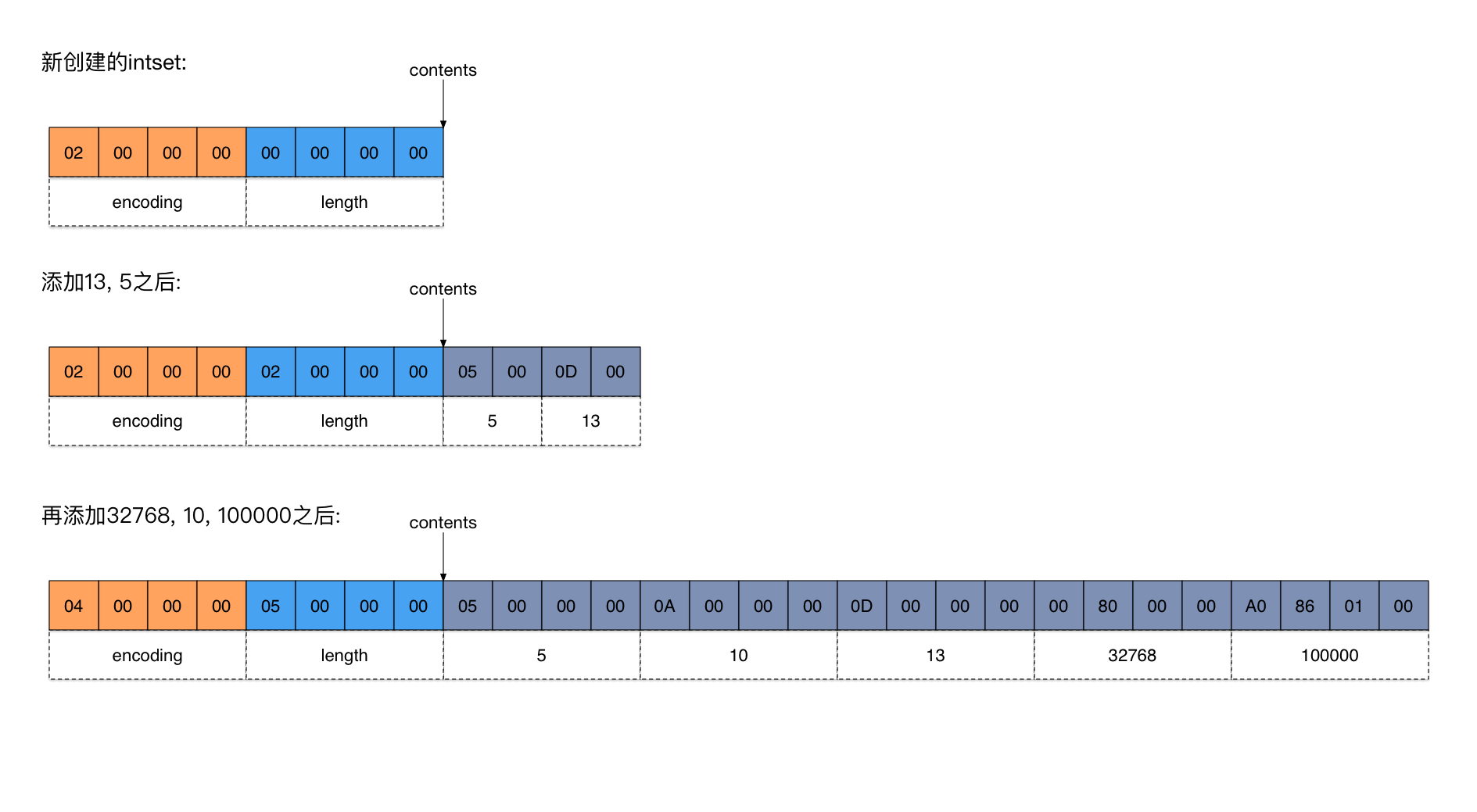顾名思义,整数集合,Set 的底层数据结构实现之一,另外一种实现是 hashtable。
实际上 intset 是一个有序数组,通过二分查找快速判断一个元素是否属于这个集合,但是为了保证有序性,插入的时候也会先二分查找找到对应的插入位置,将插入位置之后的元素统一向后移动一个位置,redis 使用了该结构来降低内存使用率,时间换空间。
# intset 的结构
typedef struct intset {
uint32_t encoding;
uint32_t length;
int8_t contents[];
} intset;
-
encoding:数据编码,表示 intset 中的每个数据元素用几个字节存储,有三种可能的取值:
-
INTSET_ENC_INT16:16 位整数,表示每个元素用 2 个字节存储
-
INTSET_ENC_INT32:32 位整数,表示每个元素用 4 个字节存储
-
INTSET_ENC_INT64:64 位整数,表示每个元素用 8 个字节存储
-
length:表示 intset 中的元素数量
-
contents:柔性数组,存储具体的数据,长度 = encoding * length
随着数据的增加,encoding 可能会改变:

如上图,新创建的 intset 只有 encoding 和 length,encoding 默认值是 INTSET_ENC_INT16,添加 13 和 5 之后,length 变成 02。但是继续添加 32768,10,100000 时,encoding 就从 INTSET_ENC_INT16 变为了 INTSET_ENC_INT32,这是因为 INTSET_ENC_INT16 的最大长度为 - 215~215-1,32768 超出了返回,所以升级到 INTSET_ENC_INT32。
# intset 的查找与新增
# 查找元素
/* Determine whether a value belongs to this set */
uint8_t intsetFind(intset *is, int64_t value) {
uint8_t valenc = _intsetValueEncoding(value);
return valenc <= intrev32ifbe(is->encoding) && intsetSearch(is,value,NULL);
}
/* Search for the position of "value". Return 1 when the value was found and
* sets "pos" to the position of the value within the intset. Return 0 when
* the value is not present in the intset and sets "pos" to the position
* where "value" can be inserted. */
static uint8_t intsetSearch(intset *is, int64_t value, uint32_t *pos) {
int min = 0, max = intrev32ifbe(is->length)-1, mid = -1;
int64_t cur = -1;
/* The value can never be found when the set is empty */
if (intrev32ifbe(is->length) == 0) {
if (pos) *pos = 0;
return 0;
} else {
/* Check for the case where we know we cannot find the value,
* but do know the insert position. */
if (value > _intsetGet(is,max)) {
if (pos) *pos = intrev32ifbe(is->length);
return 0;
} else if (value < _intsetGet(is,0)) {
if (pos) *pos = 0;
return 0;
}
}
while(max >= min) {
mid = ((unsigned int)min + (unsigned int)max) >> 1;
cur = _intsetGet(is,mid);
if (value > cur) {
min = mid+1;
} else if (value < cur) {
max = mid-1;
} else {
break;
}
}
if (value == cur) {
if (pos) *pos = mid;
return 1;
} else {
if (pos) *pos = min;
return 0;
}
}
intsetFind 在指定的 intset 中查找 value,找到返回 1,否则返回 0。
首先使用_intsetValueEncoding 判断 value 的 encoding,如果要搜索的 value 的 encoding 小于当前的 encoding,那元素肯定不存在。
encoding 符合当前 intset,则调用 intsetSearch,该方法是二分查找算法的实现,查到元素时,返回元素位置,没查到元素时,会将 pos 设置为 min,这是为了之后的插入做准备。
# 插入元素
/* Insert an integer in the intset */
intset *intsetAdd(intset *is, int64_t value, uint8_t *success) {
uint8_t valenc = _intsetValueEncoding(value);
uint32_t pos;
if (success) *success = 1;
/* Upgrade encoding if necessary. If we need to upgrade, we know that
* this value should be either appended (if > 0) or prepended (if < 0),
* because it lies outside the range of existing values. */
if (valenc > intrev32ifbe(is->encoding)) {
/* This always succeeds, so we don't need to curry *success. */
return intsetUpgradeAndAdd(is,value);
} else {
/* Abort if the value is already present in the set.
* This call will populate "pos" with the right position to insert
* the value when it cannot be found. */
if (intsetSearch(is,value,&pos)) {
if (success) *success = 0;
return is;
}
is = intsetResize(is,intrev32ifbe(is->length)+1);
if (pos < intrev32ifbe(is->length)) intsetMoveTail(is,pos,pos+1);
}
_intsetSet(is,pos,value);
is->length = intrev32ifbe(intrev32ifbe(is->length)+1);
return is;
}
/* Upgrades the intset to a larger encoding and inserts the given integer. */
static intset *intsetUpgradeAndAdd(intset *is, int64_t value) {
uint8_t curenc = intrev32ifbe(is->encoding);
uint8_t newenc = _intsetValueEncoding(value);
int length = intrev32ifbe(is->length);
int prepend = value < 0 ? 1 : 0;
/* First set new encoding and resize */
is->encoding = intrev32ifbe(newenc);
is = intsetResize(is,intrev32ifbe(is->length)+1);
/* Upgrade back-to-front so we don't overwrite values.
* Note that the "prepend" variable is used to make sure we have an empty
* space at either the beginning or the end of the intset. */
while(length--)
_intsetSet(is,length+prepend,_intsetGetEncoded(is,length,curenc));
/* Set the value at the beginning or the end. */
if (prepend)
_intsetSet(is,0,value);
else
_intsetSet(is,intrev32ifbe(is->length),value);
is->length = intrev32ifbe(intrev32ifbe(is->length)+1);
return is;
}
/* Resize the intset */
static intset *intsetResize(intset *is, uint32_t len) {
uint64_t size = (uint64_t)len*intrev32ifbe(is->encoding);
assert(size <= SIZE_MAX - sizeof(intset));
is = zrealloc(is,sizeof(intset)+size);
return is;
}
依旧是先判断插入的 value 的 encoding,如果大于当前 intset 的 encoding,则调用 intsetUpgradeAndAdd 对 encoding 进行升级。
如果不需要扩容,就调用 intsetSearch 查找是否已经存在,如果能查到,就直接返回,不添加 value。
如果没查到,调用 intsetResize 扩容,同时调用 intsetMoveTail 将待插入位置后面的元素统一向后移动 1 个位置。
显然插入元素的时间复杂度为 O (n)。